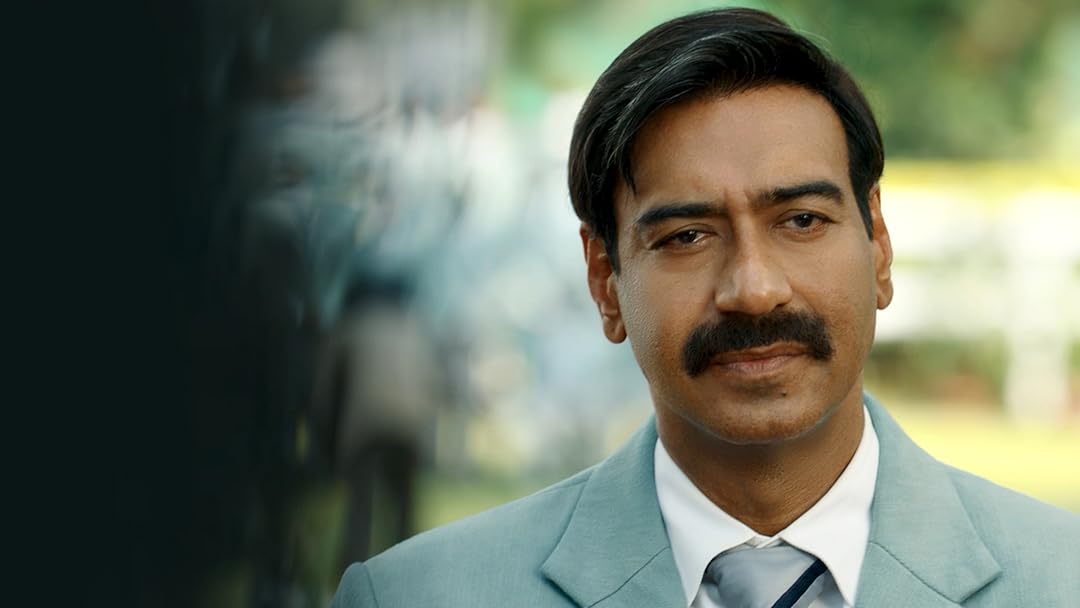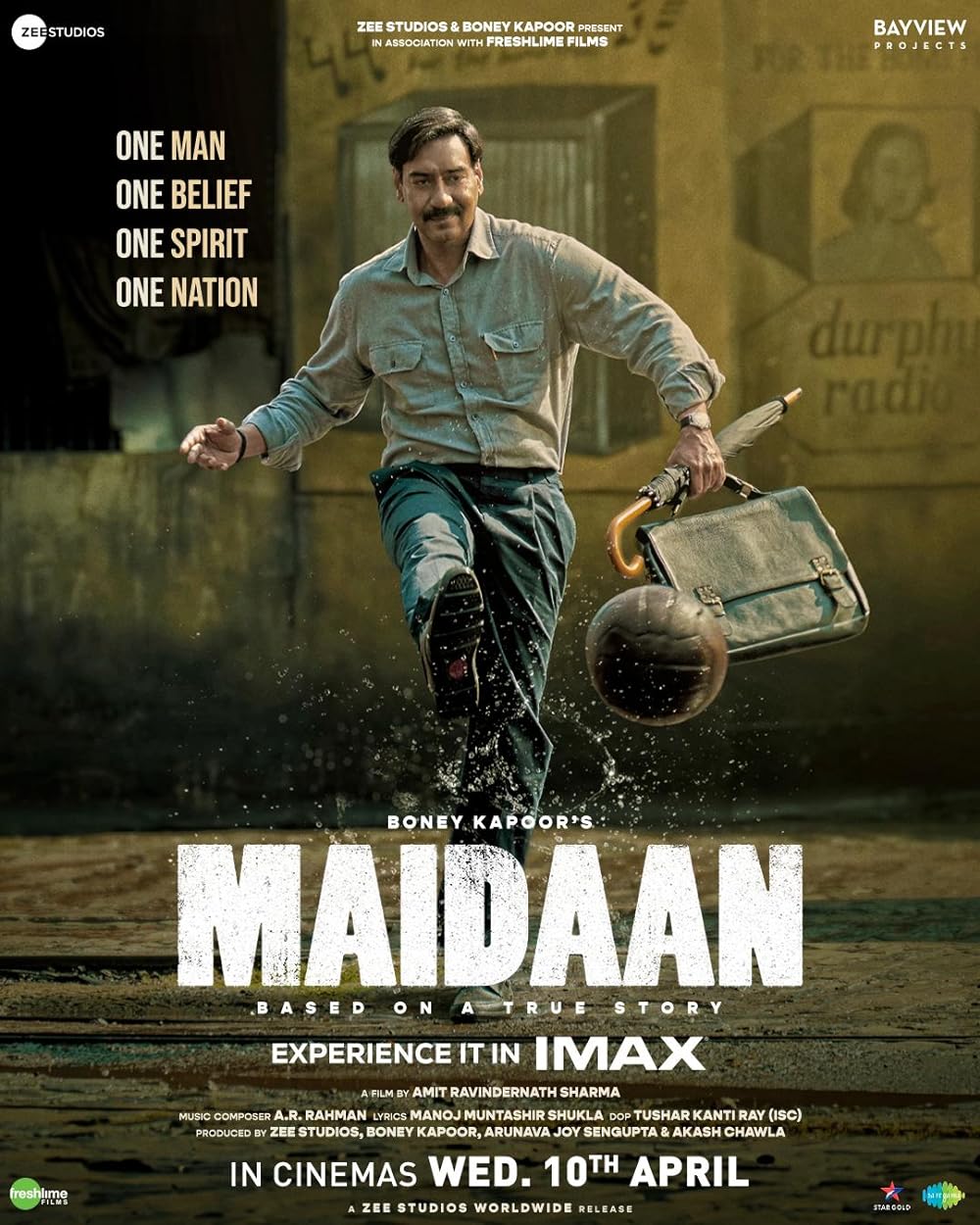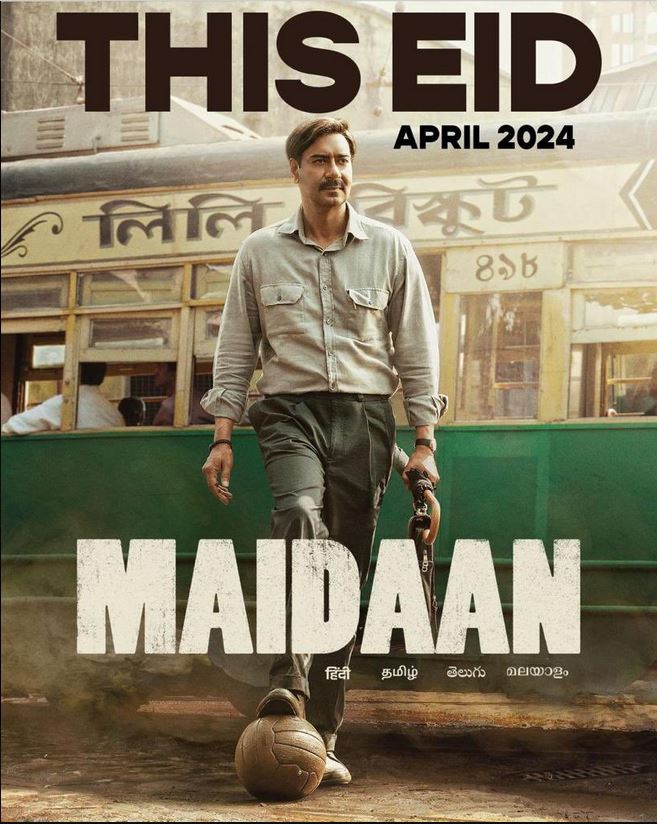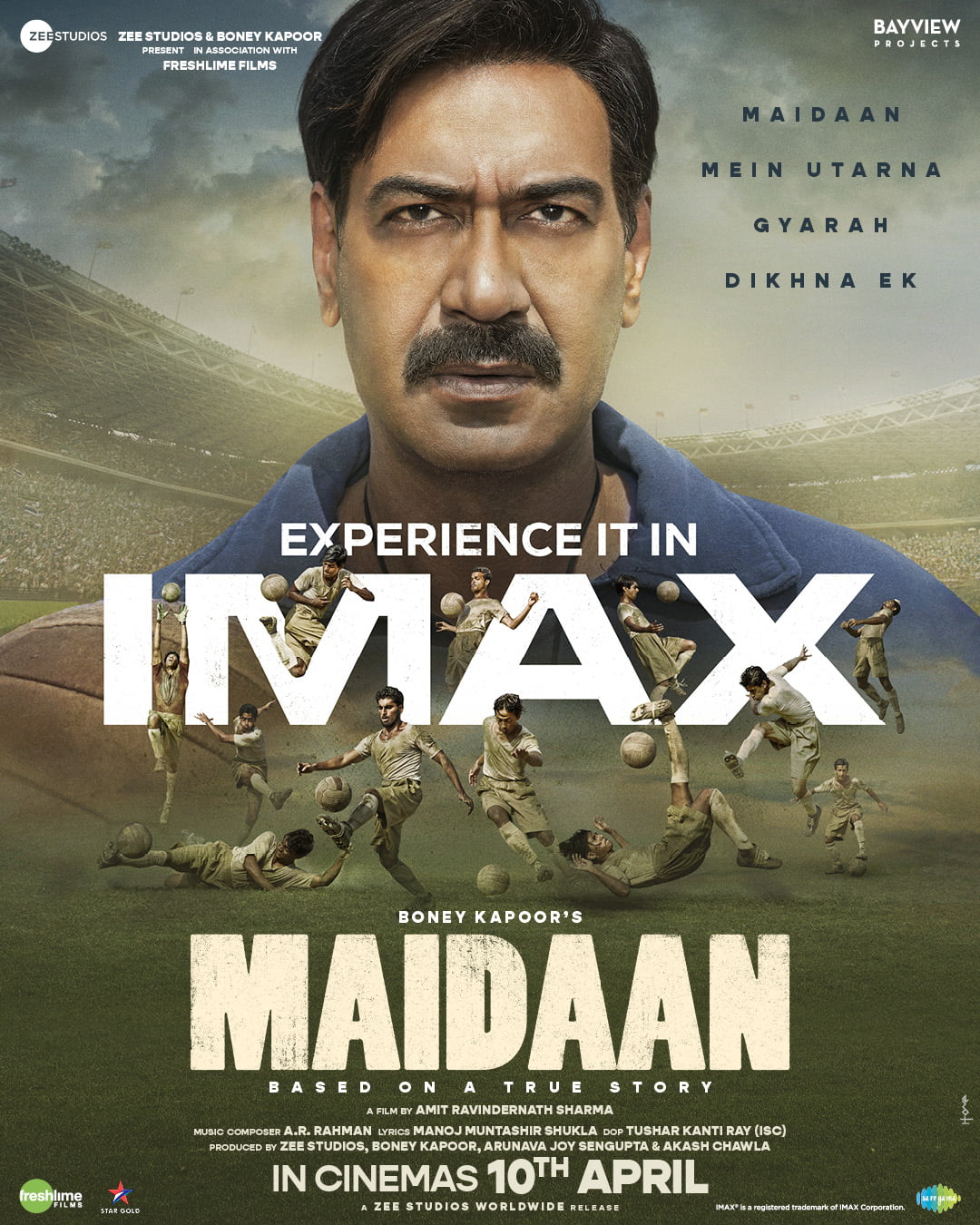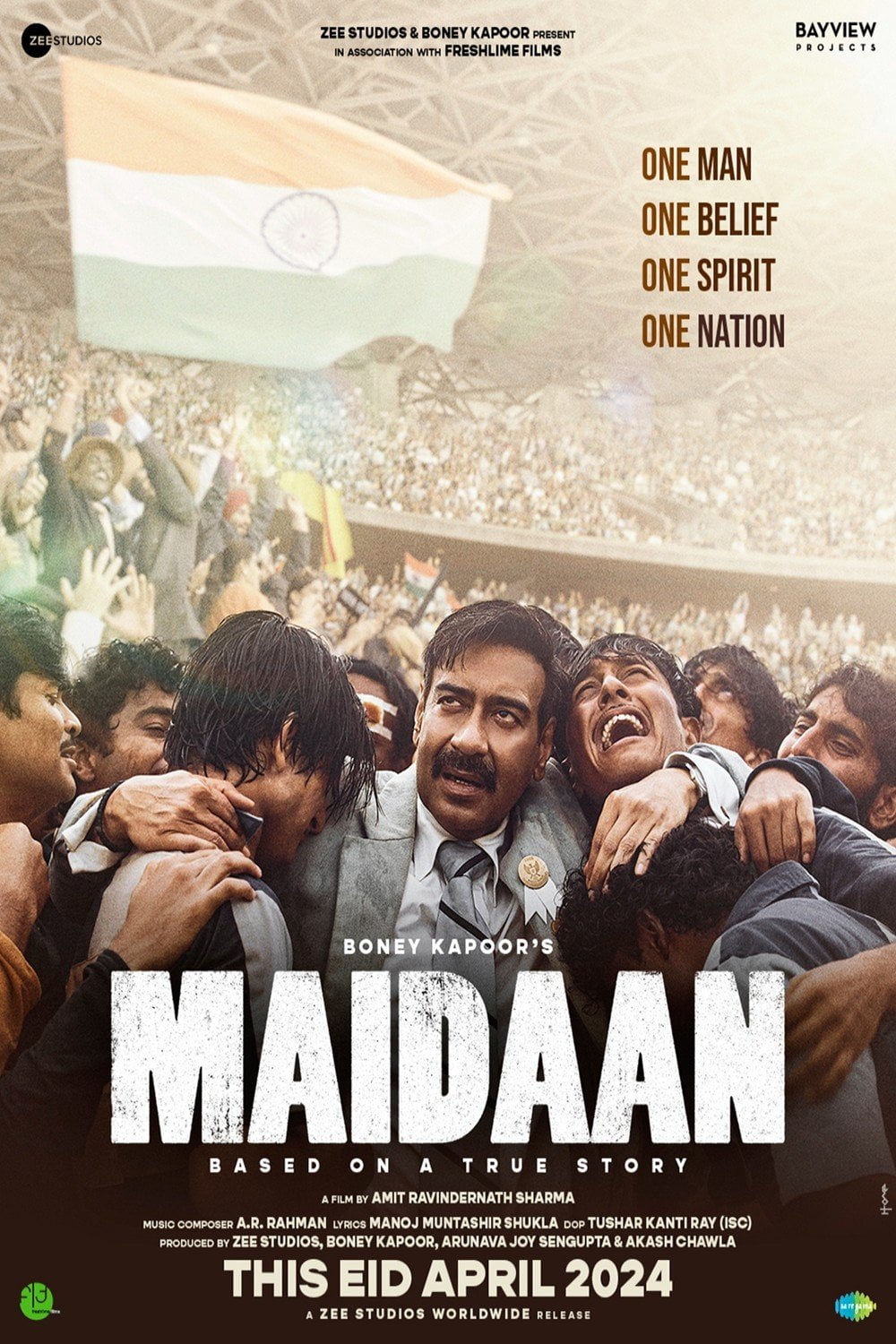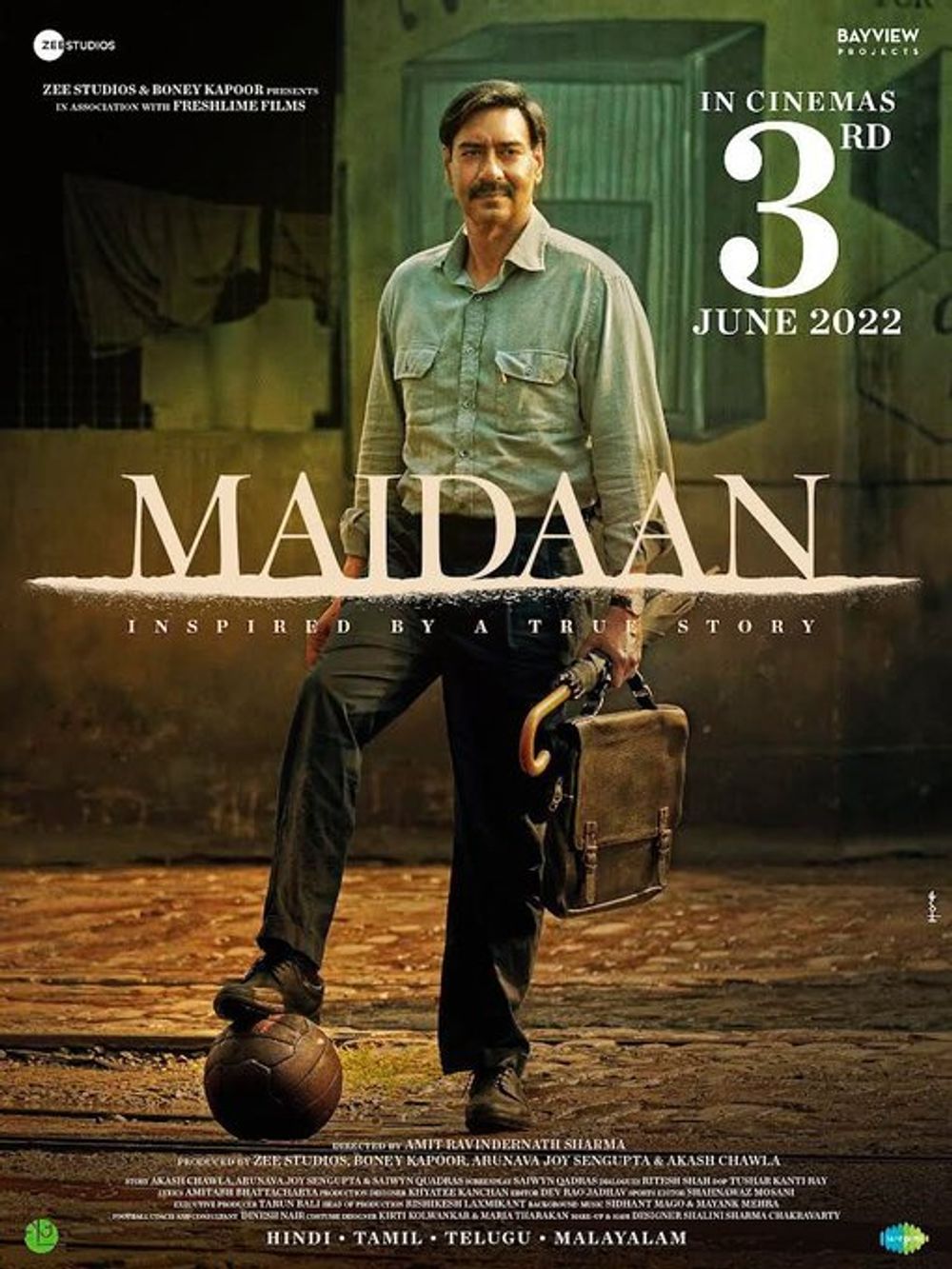Maidaan is a sports film paying homage to Syed Abdul Rahim, the greatest football coach in Indian history. An Amit Ravindernath Sharma direction, Maidaan is a true lesson in how sports films should be created. It has Ajay Devgn in almost every frame, and he shines bright.
The film does not stop at a game or the journey to success, it deals with what goes behind the making of a successful sports team. The personal lives of players and the coach are precisely dealt with. The audience is allowed to know just enough, and not too much.
The film does not stop at a game or the journey to success, it deals with what goes behind the making of a successful sports team.
There are no overbearing romantic stories or love songs in Maidaan. A 3-hour film is dedicated to the man who once made Indian football formidable. It is a film that commands attention and grips the audience, especially in the latter half.
Maidaan: a sports film true to its grain
Maidaan has everything that a good sports film must have. It has the hunger for success, a losing team that never wins, a power-hungry bureaucracy, a coach desperate for a win, some sincere players, and a system that fails them all.
With high testosterone and masculinities at their peak, football players are forged to compete with the best teams in the world. They fall and are bruised but don’t accept defeat. It is an ideal sports flick with motivational dialogues, trying times, the need to win, and the situation defeating them, except for the climax.
The songs blend in with the plot and don’t distract. The lyrics are well written and the music builds the tempo wherever required. The story is fabricated seamlessly and there are almost no loose ties. Maidaan flows comfortably and the time becomes an asset rather than a liability.
Like every sports flick, the coach’s motivational dialogues resonate with the audience and his situation is aptly communicated through the interventions of his wife.
Like every sports flick, the coach’s motivational dialogues resonate with the audience and his situation is aptly communicated through the interventions of his wife. He tries to fight the system to build a team that could win international football matches and also succeeds in his endeavour, only after losing a lot.
The fight between the haves and have-nots in Maidaan
Maidaan begins with an international football match where the Indian team is losing miserably. The camera then zooms on the bruised and taped feet of Indian players. The other side is playing wearing sophisticated shoes while Indian players are barefoot. In an agonising shot, a boot steps on the player’s feet causing the audience to whimper.
It sets the tone of the conflict between the haves and have-nots and all the struggles that the Indian team must endure before they could even play the coveted Asian Games. From picking a player from the streets of Secunderabad to coaching him along with celebrated Indian team players, coach Rahim looks at sports beyond the class gap and propagates the value of sportsman spirit.
Maidaa traces the post-independence timeline and ends at the 1962 Asian Games. The years depict the forming of a new nation that has fought for independence and is learning to stand on its feet. The film uses the backdrop to paint the glorious picture of independence and claiming freedom on the ground.
The sports, the system, and beyond
Maidaan is a three-hour-long journey of the Indian football team reaching its pinnacle, but it does not end at the sports field. It goes beyond and dives into the boardrooms where the fate of the team is sealed by old men smoking cigarettes, laughing at misogynistic jokes, sipping tea, and gulping samosas.
The democracy of the boardroom where the show of hands decides which coach must stay and which must leave is hysterical. The corrupt bureaucrats manipulating the system to benefit their interests is a recurring hindrance in the destiny of the Indian team.
The democracy of the boardroom where the show of hands decides which coach must stay and which must leave is hysterical.
A vengeful journalist played by Gajraj Rao becomes the inevitable villain. From spewing words of hate in the newspaper to advising the Indian government to cancel the football delegation, he prays for the defeat like no other. His change of heart marks the ideal conclusion to the sports flick.
The government that does not have enough dollars, and the boardroom filled with old territorial men mark the country’s scenario. Football could be acceptable only when Bengalis play and lead the team. A Hyderabadi man coaching the team becomes a point of contention and the diverse team he puts together becomes a sour pill to swallow.
Impeccable cinematography
Sports films are made great by the choice of uptempo background scores and cinematography. While the music and the timing are unmatched, the cinematography is also exemplary in Maidaan. The shots captured during the matches are worthy of a special mention.
The camera swirls and kicks with the players and captures every drop of sweat during the game. The motion makes the actions more relatable and the energy is communicated beautifully.
The camera swirls and kicks with the players and captures every drop of sweat during the game.
Maidaan is a bouquet of awesome acting and beautiful plot design. The story flows with a grace that must be appreciated.
The personal lives of the characters in Maidaan
The final thread that ties Maidaan together is the personal lives of the players and the coach. While the lives are not discussed in excruciating detail, the diseases interfere with the plot. Lung cancer becomes a trigger for Rahim to give it his absolute best but derails the plan of the Indian team winning the Olympics.
Rahim’s wife played by Priyamani leaves her impression. She becomes the backbone of the house and Rahim’s career. She is a coy bride but is not afraid to learn English or to lecture Rahim on parenting, and to force him to fight for his dream when near death.
When Rahim is vulnerable and counting his days sitting at home, she pushes him to fight one last time and stays glued to the radio throughout the matches.
At a juncture, she asserts that it is her house and her house is meant to live in and not die in. When Rahim is vulnerable and counting his days sitting at home, she pushes him to fight one last time and stays glued to the radio throughout the matches. She plays an exemplary role and balances the gender scale in Maidaan.
Maidaan must be watched once, to experience the surge of emotions, to witness how one man fights for a national team, and to witness the beauty of the journey. The visuals are authentic to its time, some characters are stereotyped but do not become an eyesore. Every character of the national team excels in the art of football, the expressions during the game, and carrying the narrative of the film.
It is a proud chapter of independent India and Maidaan does justice to it. It is not an artistic piece or a film that digs beyond the surface, but it entertains and proves to be a good family weekend flick. Maidaan, true to its name, depicts the foundation of Indian football being laid and celebrated. The end credits deserve a special mention where the real football players were invited in their jerseys and medals. The sight suited the climax well and the coordinated photographs resonated with the entire theme.
Maidaan is a sensible move in the cauldron of fanatic nationalism. It is balanced, valedictory, and celebratory. It ends with a call to redo the magic as it has been 65 years since we won the title, and the Indian football team has not bagged an international medal since then.
About the author(s)
Dr. Guni Vats is an Assistant Professor at the Department of English, Manav Rachna International Institute of Research and Studies. A PhD in Gender Studies, she is a renowned researcher, writer, and scholar.
